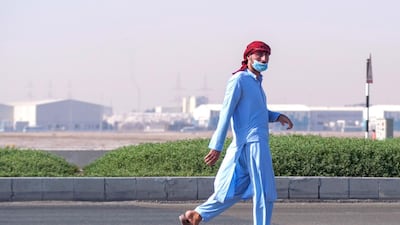Air pollution in Abu Dhabi has continued to drop due to measures taken to stem the spread of coronavirus.
In late March, the UAE asked almost all public and private sector employees to work from home due to the pandemic.
Around the same time, the country introduced a nightly stay at home order to sanitise the streets.
Together, the measures resulted in a dramatic fall in the number of cars on the road, causing levels of nitrogen dioxide to plummet.
"Spanning a period of eight weeks, we have been monitoring air quality in Abu Dhabi and noticed a significant decrease in air pollutants which implies that limiting traffic movement has had an extremely positive effect on the environment,” said Dr Shaikha Salem Al Dhaheri, secretary general of Environment Agency Abu Dhabi.
She said within six weeks, there had been a 50 per cent decrease in nitrogen dioxide on average.
That has fallen further again since, with a 62 per cent total reduction in levels of the pollutant over eight weeks.
Some areas even saw a greater drop, such as Al Maqta, at 78 per cent. Khalifa City also registered a significant decrease in nitrogen dioxide emissions, at 70 per cent.
"This trend is in line with the global improvement in air quality in several of the major cities of the world that have imposed strict regulations on movement to encourage social distancing and save lives,” said Ms Al Dhaheri.
“Wuhan was one of the first cities that revealed a notable improvement in air quality followed by other locations in Europe and the United States.”
“Within the region, several prominent organisations have also reported a drop in air pollution levels in countries across the entire GCC region.”
Strict measures imposed to stem the spread of Covid-19 forced a third of the world's population into lockdown at one point.
Across the globe, skies, seas and rivers became cleaner and quieter, while highways emptied.
The United Nations' World Meteorological Organisation (WMO) said the improvements were only temporary and long-term plans were still needed to address climate change.
The WMO said a new global temperature record is likely to occur in the next five years if nothing was done to reverse climate change.
Its secretary general, Petteri Taalas said the world needed to show the same determination and unity against climate change as it had against Covid-19.
“We need to act together in the interests of the health and welfare of humanity not just for the coming weeks and months, but for many generations ahead.”
Ms Al Dhaheri said EAD would work with other organisations to maintain the positive air quality in Abu Dhabi.
EAD monitors 17 pollutants in the capital via a network of 20 fixed and two mobile stations.

